A Day in the Life: Sr Kim Barnes
October 8, 2020A Day in the Life of Kim Barnes rsj – Lochinvar Josephite
And so, reflecting on this, I begin my ministry each day as a chaplain at Catholic Care Social Services. I try to see that all those I reach out to are part of that tapestry – each a coloured thread and in between a golden thread connecting us to a much stronger, deeper, caring, and loving relationship with our God.
I have been working at Catholic Care since 2014. In my role I aim to be a presence to others, to listen with respect, to be non-judgemental, to be confidential and caring and to be with people in their times of joy as well as their times of pain. During the past six years I have supported both staff and clients. No two days are ever the same. It is a ministry that is interesting, life-giving, unpredictable and at times challenging but it also brings many blessings. These challenges and blessings have brought me and some of those I reach out to on behalf of Catholic Care, to a much deeper and closer relationship with God.
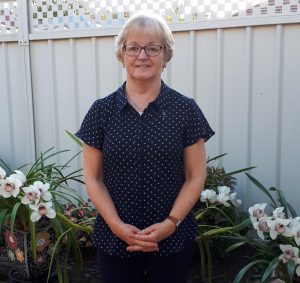
The time I spend with staff is so important. I begin each day walking around the office simply to say hello to all. If they have time to engage in some way, we have a chat or a chuckle about what is happening at that time. I try to pick up on the atmosphere in general to gauge how their day is starting out. This may lead me to make further contact by sending an email to an individual or group perhaps with a prayer attached or a funny little memo to brighten their day.
In addition, my time is spent attending funerals, visiting hospitals and nursing homes and people in their own homes, accompanying when asked to medical appointments or solicitors, contacting St Vincent de Paul or other welfare agencies when extra support is needed. As well, I am a member of a couple of Diocesan Committees and so attend these meetings on a regular basis.
Because of the challenges, and therefore changes we are all facing in this time of Covid-19, some of my day to day ministries have gone from face to face visits to making contact by phone and attending Zoom meetings.
As I write I have paused to look at a poster that hangs on my office wall. There are three gorgeous meerkats all standing tall and looking out in different directions. Underneath there are words with the heading: “Four Beautiful Thoughts of Life.”
- Look back and Get Experience
- Look forward and See Hope
- Look around and Find Reality
- Look within and Find Yourself
This poster has hung on my wall for a couple of years and little did I know how much it would speak to and touch not only me but those who have come into my office during these uncertain times.
Another poster I have on the wall is one of Jesus standing and knocking at a door. It has the words: “I stand at the door and knock; if any hear my voice and open the door, I will come into their house…” (Rev.3:20). I do my best to be a presence to all those who knock on my door by welcoming them into a place where they can just be, talk, cry, vent, pray or even have time out alone if needed.
Then there is the one of a young and very handsome Jesus fitting in with and relating more with young people in today’s world. I often have conversations with staff, initiated by them, about this man we call Jesus and how they relate to this picture because he “looks” human and so much more approachable.
Through my ministry at Catholic Care I have listened to people from all walks of life and from various faith backgrounds, some who believe and others who do not – or so they say!
These past six years have been a broadening and rewarding experience for me, one that opens me, and others, to deep, unchartered waters.
Kim Barnes rsj
On the Spirituality of Fr Julian Tenison Woods
Spirituality: the inclination of the heart and how it is moved in God’s promptings.
The following are different aspects of Father Woods’ spirituality. They are interrelated and integrated.
The first is awe before God. At Penola, on Pentecost Sunday 2010, Mary’s canonisation year, Fr Paul Gardiner sj preached at Mass before the opening of Fr Woods Park. He said that Fr Woods’ spirituality was grounded in his awe before God, that all other gifts of the Spirit in his life were on this foundation: awe before God, inspired by the vast cosmos, the huge variety of life forms, the structures invisible to the human eye and the mystery of God within each person.
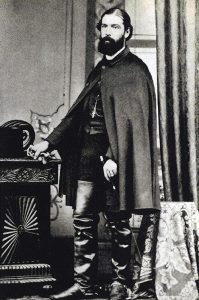 Another aspect of Fr Julian’s spirituality is a deep sense of the Incarnation: recognising the Incarnate God in the person of Jesus and losing his heart to Him. It was Jesus in his family, Jesus in his infancy- ‘little tot’, Jesus in His Sacred Heart, Jesus in his weakness, Jesus in suffering, on the cross. It was Jesus in frailty and weakness whom Julian saw in the children and adults of his time: it was this same Jesus he gave himself to serve.
Another aspect of Fr Julian’s spirituality is a deep sense of the Incarnation: recognising the Incarnate God in the person of Jesus and losing his heart to Him. It was Jesus in his family, Jesus in his infancy- ‘little tot’, Jesus in His Sacred Heart, Jesus in his weakness, Jesus in suffering, on the cross. It was Jesus in frailty and weakness whom Julian saw in the children and adults of his time: it was this same Jesus he gave himself to serve.
Next, his love for Mary, the mother of Jesus. Julian’s knowing Jesus in his family meant his knowing Mary personally and a life-long love for her. He pondered her joys and sorrows. In the sorrows, rejection, misunderstanding and isolation in his own life, he gained his strength not only from communion with Jesus in his suffering, but with Mary in her sufferings as the mother of Jesus. His favourite title of Mary was the Immaculate Heart of Mary. His frequent prayer was Sweet Mother I’m trusting to you. His love for Jesus in his infancy, childhood and youth let him also know and love Joseph personally. He entrusted himself to Joseph as his protector.
In Julian’s attitude, all aspects are united in Jesus, above all in the Sacred Word and the Eucharist. Here he was with the living Risen Jesus. The living Risen Jesus was real for him. He was with Him, person to person.
Another aspect is the totality of his dedication to God, responding to God with his whole heart, giving absolutely all his being, his energy. His motto in his crest was Vota Vita Mea. My life is vowed, my life is consecrated. It was everything, interior and whole being, for God. (Col 3: 24a).
The total dedication summoned courage in the conviction that ‘I will be with you and will not fail you.’ (Fr Woods’ Desk plate, Dt 31 :8, Jer 1:8). It gave trust despite all odds. He wrote in his last months, ‘It is with hopeful confidence that I say resurgam. (I will rise up). I am cheerful and happy’. (Fr Woods to friend, William Archer 13 Mar 1889).
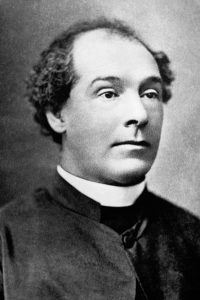 The last aspect I note was his living out obedience to God, submitting himself humbly to the designs of God, giving himself in love as again and again he moved or was moved from place to place, task to task, right to the end when stripped of health and church recognition. Mary MacKillop spoke of this aspect in his leaving Adelaide. (Julian Tenison Woods: A Life, 153-4, 2010 edition) Today, some would call this adjusting to changes as going with the flow. Yes, that is true. But it often meant total uprooting and cost deeply, interiorly. In the keen suffering, he kept the gaze of his heart on Jesus. He wrote in his poem, Follow Me.
The last aspect I note was his living out obedience to God, submitting himself humbly to the designs of God, giving himself in love as again and again he moved or was moved from place to place, task to task, right to the end when stripped of health and church recognition. Mary MacKillop spoke of this aspect in his leaving Adelaide. (Julian Tenison Woods: A Life, 153-4, 2010 edition) Today, some would call this adjusting to changes as going with the flow. Yes, that is true. But it often meant total uprooting and cost deeply, interiorly. In the keen suffering, he kept the gaze of his heart on Jesus. He wrote in his poem, Follow Me.
In summary, I offer these words of Proverbs as the key his spirituality:
Paraphrasing
Jan Tranter rsj
Sources:
[1] Hymns and Sacred Poems by Julian Tenison Woods, Alvernia, Sydney, 1890
This talk was presented at the gathering of Sisters of St Joseph, Nundah, 7 October 2018
The Mission of God
Towards an Ongoing Understanding of Mission.
Introduction
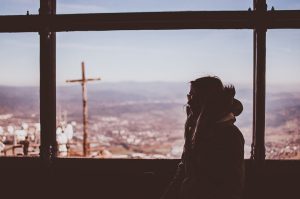 And Jesus came and said to them, “… Go therefore and make disciples of all nations”. (Matt 28:18-19) Matthew’s Gospel places these words in the mouth of the resurrected Jesus. We embrace this call to participate in the Mission of God in Baptism. Christians are to “witness to and preach the gospel not only because of Christ’s command, but especially because (we) Christians are caught up in that overflowing fountain of the triune God’s love and mercy toward the world.” [1] This article is a theological reflection on mission and its current understanding as the Mission of God – Missio Dei.
And Jesus came and said to them, “… Go therefore and make disciples of all nations”. (Matt 28:18-19) Matthew’s Gospel places these words in the mouth of the resurrected Jesus. We embrace this call to participate in the Mission of God in Baptism. Christians are to “witness to and preach the gospel not only because of Christ’s command, but especially because (we) Christians are caught up in that overflowing fountain of the triune God’s love and mercy toward the world.” [1] This article is a theological reflection on mission and its current understanding as the Mission of God – Missio Dei.
Throughout Christian history mission has been understood and practiced in different ways – influenced by the Gospel, the signs of the times, historical and cultural studies, the experience of mission, and the current theology. Our secular, postmodern culture “opens up rather than shuts down the possibility of faith and of a new and exciting understanding of Christian mission.” [2]
Mission of God – Missio Dei
At the 1932 Brandenburg Mission Conference Karl Barth [3] presented a paper stating that mission was not primarily a human activity of witness and service, the work of the church. He insisted “it was primarily God who engages in mission by sending God’s self in the mission of the Son and the Spirit.” [4]
This led to the understanding of mission as the Mission of God – Missio Dei. [5] Missio Dei is “God’s dynamic process” in which we as church are invited to participate rather than seeing the church and ourselves as having a mission.[6] This paradigm is a new framework in which to rethink our former understanding of mission. David Bosch writes, “Our mission has no life of its own: only in the hands of the sending God can it truly be called mission, not least since missionary initiative comes from God alone.” [7] Newer understandings of the Trinity emerged in the latter part of the 20th century, coming from a concern to relate the Trinity to the life of the church and the world. In the Catholic tradition the “general renewal in Trinitarian theology can be traced back to Karl Rahner’s 1967 essay on the Trinity.” [8]
As the Trinity is central to our Christian faith, these newer understandings have the potential to transform our own relationships and those of the Church with the world and the whole of creation. Catherine LaCugna writes, “Living Trinitarian faith means living God’s life: living from and for God, from and for others… Living Trinitarian faith means living together in harmony and communion with every other creature in the common household of God, ‘doing all things to the praise and glory of God’.” [9]
LaCugna writes further, “The doctrine of the Trinity affirms that the ‘essence’ of God is relational, other-ward, that God exists as diverse persons united in a communion of freedom, love and knowledge.” [10] Given that God is a God of mutual and equal relations then the fundamental nature of all reality is relational. [11]
Pauline Wicks rsj
Footnotes:
[1] Stephen B Bevans, “Revisiting Mission at Vatican II: Theory and Practice for Today’s Missionary Church” in David G. Schultenover, ed., 50 Years On: Probing the Riches of Vatican II (Minnesota: Liturgical Press, 2015), 206.
[2] John C. Sivalon, God’s Mission and Postmodern Culture: The Gift of Uncertainty (New York: Orbis Books, 2012), 32. Sivalon is a Maryknoll priest. He served as a missioner in Tanzania and now lectures in the USA.
[3] Karl Barth (1886-1968) was a theologian in the Swiss Reformed Church tradition.
[4] Bevans, Stephen and Roger P Schroeder, Constants in Context: A Theology of Mission for Today (New York: Orbis Books, 2004), 290. Bevans and Schroeder are American born SVD priests.
[5] Steven Bevans, “Partnering with God: Reimagining Mission for Today”, www.mohmv.com.au/Resources/Stephen Bevans, downloaded March 2020. Missio Dei, or the Mission of God “has a long history in Christian theology, with roots in the Scriptures, in writings of earliest theologians of the church through the Middle Ages, and appearing also in the seventeenth century in the Trinitarian theology of the French School.” 5.
[6] Sivalon, God’s Mission and Postmodern Culture: The Gift of Uncertainty, 35.
[7] David Bosch. Transforming Mission: Paradigm Shifts in Theology of Mission (Maryknoll, NY: Orbis Books, 1991), 390. Bosch (1929-1992) was a theologian and missiologist. He ministered in South Africa and was a member of the Dutch Reformed Church.
[8] Bevans and Schroeder, Constants in Context, 291.
[9] Catherine Mowry LaCugna, God for Us: The Trinity and Christian Life (New York: Harper Collins, 1991), 400, 401. LaCugna (1952-1997) was an American Catholic theologian.
[10] LaCugna, God for Us: The Trinity and Christian Life, 243.
[11] Denis Edwards, The God of Evolution: A Trinitarian Theology (New York: Paulist Press, 1999), eBook, Chapter 2.
Image: Woman Mood Cross by Free-Photos. Obtained from Pixabay. Used with permission.
Our Inspirational Saint Mary of the Cross
This month we pay a special tribute to Saint Mary MacKillop as we celebrate ten years since her canonisation in Rome by Pope Benedict XVI.
 As Australia’s first Saint we reflect anew on this woman close to our hearts who demonstrated a passion for justice, a respect for human dignity, the courage of her convictions and feminist leadership is our own Mary MacKillop. She set hearts of the young women who flocked to join her on fire; she was true to her values and unwaveringly acted accordingly. She knew hardship, illness and concerns about the congregation and her family. Her life was anchored in the love of the God she trusted and in in providential care she placed her life. As her followers we applaud her place in society, and in the church. We appreciate the example that she has given us to live by. May this coming celebration of the ten years since canonisation grant us a deeper understanding of her greatness and holiness and inspire us by her courage and faithfulness.
As Australia’s first Saint we reflect anew on this woman close to our hearts who demonstrated a passion for justice, a respect for human dignity, the courage of her convictions and feminist leadership is our own Mary MacKillop. She set hearts of the young women who flocked to join her on fire; she was true to her values and unwaveringly acted accordingly. She knew hardship, illness and concerns about the congregation and her family. Her life was anchored in the love of the God she trusted and in in providential care she placed her life. As her followers we applaud her place in society, and in the church. We appreciate the example that she has given us to live by. May this coming celebration of the ten years since canonisation grant us a deeper understanding of her greatness and holiness and inspire us by her courage and faithfulness.
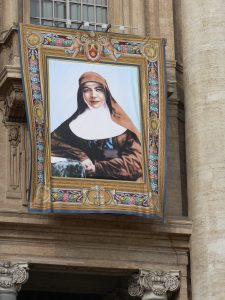 Our down to earth Mary is a Saint many can relate to, being both feisty and fearless yet human and ordinary. We recognize her saintliness which is an inspiration which offers a vibrancy and active presence for Australians today.
Our down to earth Mary is a Saint many can relate to, being both feisty and fearless yet human and ordinary. We recognize her saintliness which is an inspiration which offers a vibrancy and active presence for Australians today.
Each of us will have our own jubilant recall of this great event in our lives and in the life of the Church. Let us all look forward to the celebration with triumphant joy!
Let us take time to ponder the part that St Mary MacKillop plays in our lives by her example of life and her faith in God.
- Can you recall where you were ten years ago when Mary’s sainthood was proclaimed? Did you watch the event in Rome, or locally? Perhaps you caught a glimpse on the nightly news.
- Is Mary’s influence on your life from her from the love of the people in need, her determination in life’s events or devotion to her family?
Let us celebrate this wonderful woman and ask God’s blessings that we have the strength and inspiration to live the best life we possibly can.
Michele Shipperley rsj
Josephites Got Talent 2020
October 7, 2020And the Winners Are…
Josephite talent was brought into our living rooms thanks to our creative team comprising our Yr 11 JAG (Josephite Action Group) volunteer Violet Cabral and our dedicated producer Dominique Farah (Mount St Joseph, Milperra teacher).
When COVID hit, instead of postponing until 2021 and hoping things will be back to normal, Dominique announced that we needed to be creative and so Josephites Got Talent (virtual episode) was born.
This year we had entrants from seven Josephite Schools including:
- Mount St. Joseph Girls’ College, Altona VIC
- Holy Spirit College, Bellambi NSW
- St Joseph’s Catholic College, East Gosford NSW
- Penola Catholic College, Emu Plains NSW
- Mount St Joseph, Milperra NSW
- Mary MacKillop College, Nundah QLD
- Mary MacKillop Catholic College, Wakeley NSW
Violet worked tirelessly to compile an episode of acts including dancing, singing, drama, musicianship and bands. The talent was outstanding! Teachers commented that such an event was so needed lifting our students’ spirits as a healthy school competition evolved.
The Sisters of Saint Joseph were asked to view and vote for the winner and we also included a people’s choice award voted by school staff and students.
The Social Justice awards are an integral part of this celebration of talent. In defiance of COVID, students in our schools continue to work tirelessly to promote justice and raise awareness around important social inequalities.
Take a look at some of the outstanding achievements of our young Josephite leaders here.
The dedication of the teachers at our Josephite schools continues to astound me. They have worked tirelessly this year learning how to deliver remote quality education to our students during lockdowns and restrictions. The schools of the Sisters are in safe and caring hands.
The event was a success. It has demonstrated to us all that the Spirit of Mary MacKillop lives on in our schools as staff and students sought to make the best of a confining and frustrating situation. We look forward to the performances next year.
Congratulations to all and a special thank you to Violet and Dominique for this innovative, entertaining, community-building presentation.
Karen Oxley

Julian Tenison Woods: A Life – Chapters 19th & 20th
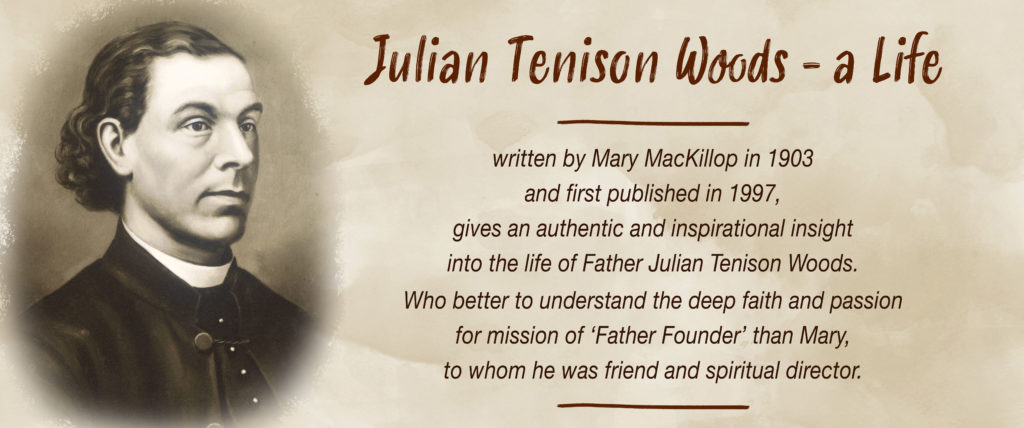
Chapters 19th and 20th
On Friday, 4th December, the Bishop arrived from Europe, bringing some priests and a community of Dominican Nuns, who would take up the higher education.
The Inspector intended the new Institute of St Joseph for parochial schools, and schools for the children of the poorer classes who were often neglected in small country places…[i]
When the priest arrived in these far-off places, his time was generally limited: he could not wait to instruct the young …[ii]
Death of Father Julian Tenison Woods
His name will be held in affectionate remembrance [i].
Mary MacKillop records the death of Fr Julian Tenison Woods.
His work was nearly over now. Partial paralysis of the hands and legs had been slowly creeping onward . . . The remarkable fortitude with which he bore his sufferings, and the resignation with which he accepted his lot – so different to what he had wished and hoped for – edified those who were privileged to witness them . . . he had to endure nearly three years of slow torture, with no hope of sufficient recovery to complete his unfinished work, or to arrange the abundant material gathered with unsparing labour and energy during his travels – sufficient for several volumes . . .
Every week, Father Woods was visited by Father Ambrosoli, Chaplain of St Vincent’s Hospital… Other priests gave many a friendly call, the Sisters visited him, but by degrees the sufferer was unable to see anyone except his immediate attendants . . . [ii]
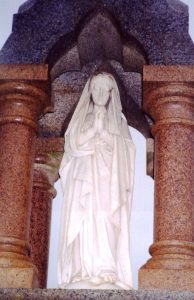 On the 6th of September, the doctor pronounced the case hopeless . . . He still lingered a short time, feeling sure that, as he had written long ago ‘The evening draweth nigh, and should not our faces shine as they are turned towards the sunset.’ On Rosary Sunday, 6th of October, he received the Last Sacraments. Early next morning, the long looked for end had come, Father Marcellus being with him at the last . . .
On the 6th of September, the doctor pronounced the case hopeless . . . He still lingered a short time, feeling sure that, as he had written long ago ‘The evening draweth nigh, and should not our faces shine as they are turned towards the sunset.’ On Rosary Sunday, 6th of October, he received the Last Sacraments. Early next morning, the long looked for end had come, Father Marcellus being with him at the last . . .
The Freeman’s Journal says,
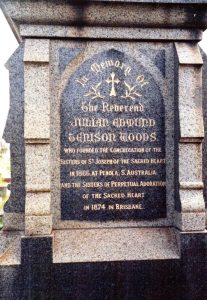 Yes, about thirty – all who could possibly attend. But in many a little convent that day, the Sisters of St Joseph, scattered across Australia, united with their Sydney Sisters in supplication for their Father Founder, though feeling that one who had suffered so long and so patiently scarcely needed prayers.
Yes, about thirty – all who could possibly attend. But in many a little convent that day, the Sisters of St Joseph, scattered across Australia, united with their Sydney Sisters in supplication for their Father Founder, though feeling that one who had suffered so long and so patiently scarcely needed prayers.
The funeral took place at 2 o’clock . . .
After some time, his fellow scientists and admirers had a beautiful monument erected over his remains. It is a block of granite, grey and sparkling, such as the geologist had often admired. On one side of the polished panels is the following inscription –
On each corner of the block is a pillar; these support curves which join in a cross, looking something like the Benediction throne over a tabernacle. In the space between the pillars is a white marble statue of the Mater Dolorosa, about three feet high.
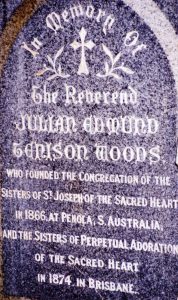 The monument rises from a marble floor, surrounded by iron railings. Standing on this floor, in front of the monument, is a stone missal (open on its stand), bearing the words – ‘Thy will be done.’
The monument rises from a marble floor, surrounded by iron railings. Standing on this floor, in front of the monument, is a stone missal (open on its stand), bearing the words – ‘Thy will be done.’
How appropriate is the last resting place of the gentle learned priest and naturalist! Crowned with the cross, beneath the statue of the ‘Sweet Mother’ whom he had so tenderly loved – a little child in the next grave, ‘Australia’s gifted son’ Deniehy [iii] at his feet, the ‘Silver-tongued’ Dalley [iv] close by – typifying all that during life had most delighted him – Devotion, Innocence, and Intellect!
There, on the hillside, overlooking the Pacific which washes far below the rocky cemetery, and murmurs a perpetual requiem in its own soul-stirring music, the mortal remains of Father J .E. Tenison Woods await the resurrection.
May he rest in peace. Amen. [v]”
Carmel Jones rsj
Sources:
[i] Page 237 of Julian Tenison Woods: A Life by Mother Mary of the Cross MacKillop . This article comprises quotations from the above book, used with the kind permission of the publishers, St Paul’s Publications. © Trustees of the Sisters of Saint Joseph 1997
[ii] Chapter 35th, p. 235
[iii] Daniel Deniehy (1825-1865), son of Irish convict parents, writer, lawyer, politician.
[iv] William Bede Dalley (1831-1888), also son of convict parents, lawyer, politician, friend of both Polding and Deniehy, Attorney General and advocate of social justice.
[v] Chapter 35th, p. 238
World Teachers’ Day
October 5, 2020World Teachers’ Day 2020.
World Teachers’ Day is held internationally on 5 October. However, in Australia it is held on the last Friday of October. Its purpose is to recognise and give thanks to teachers for the work they do in educating children. Ekner Amberger writes:
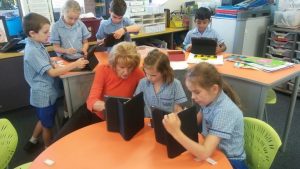 At the school in which I work, teachers believe that they do more than teach content and skills. They are concerned for the wellbeing of the whole child. World Teachers’ Day, as Elma Amberger says, ‘celebrates teaching to the emotional, intellectual and spiritual requirements of the child.’
At the school in which I work, teachers believe that they do more than teach content and skills. They are concerned for the wellbeing of the whole child. World Teachers’ Day, as Elma Amberger says, ‘celebrates teaching to the emotional, intellectual and spiritual requirements of the child.’
They see teaching as a calling. Sharon Wharton says it is a ‘calling to work with the young of today to make them inspirational ambassadors for tomorrow.’
World Teachers’ Day is an opportunity for the world, the community and the child to thank teachers. It can be a learning experience for children as parents take up this opportunity to thank teachers and encourage their children to do the same. As Elmer Amberger writes:
I love the excitement that the children bring to this special day as they come with home-made cards written neatly with messages of thanks and expressions of kindness.
Some children also come with presents. Sharon Wharton says: I’t is not the chocolates, wine or flowers we need but we really appreciate a well-considered, thank-you.’
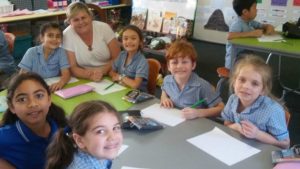 There is much for which teachers can be thanked as Sharon Wharton writes: ‘Thank you for working many hours outside of school time to ensure the child get the education and support they need to learn in a functional, positive and interactive classroom environment. Thank you for being there every day to counsel and direct the child on a positive and spiritual life’s journey. Thank you for being there to answer their questions and send them in search for answers. Thank you for teaching them to be resilient, so they can handle life’s challenges. Thank you for loving them for who they are and teaching them right from wrong.’
There is much for which teachers can be thanked as Sharon Wharton writes: ‘Thank you for working many hours outside of school time to ensure the child get the education and support they need to learn in a functional, positive and interactive classroom environment. Thank you for being there every day to counsel and direct the child on a positive and spiritual life’s journey. Thank you for being there to answer their questions and send them in search for answers. Thank you for teaching them to be resilient, so they can handle life’s challenges. Thank you for loving them for who they are and teaching them right from wrong.’
And yet, Teachers also believe that World Teachers’ Day has lost its meaning and it has become just another day with a few people remembering to say “thank-you.”
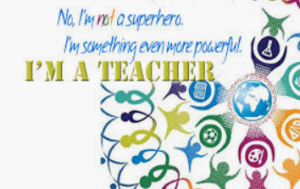 In today’s world, a lot is expected of teachers and more than ever, teachers should be recognised as professionals who truly have the best interests of their students at heart. What can we do to make world teachers’ day more significant in the lives of teachers?
In today’s world, a lot is expected of teachers and more than ever, teachers should be recognised as professionals who truly have the best interests of their students at heart. What can we do to make world teachers’ day more significant in the lives of teachers?
How can we express our gratitude to the people we entrust our children to them for 27 hours a week? Can we train our children to be grateful students? Let’s make World Teachers’ Day 2020 a significant day for teachers as their students say, “thank-you”.
Kathleen Mooney rsj
